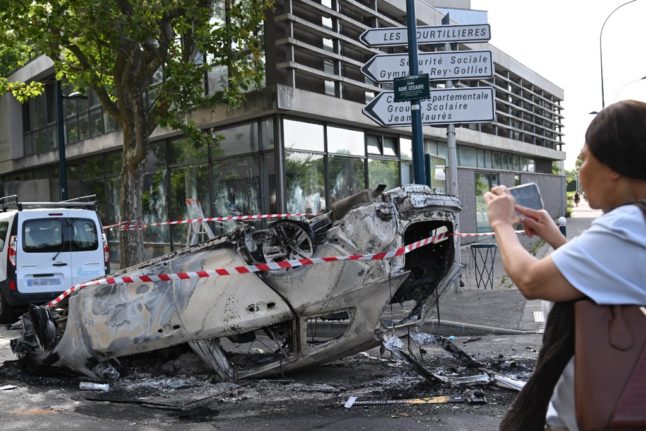Riots
Unlike trouble that flared during the pension protests, these riots are not linked to organised or declared marches, so it’s hard to predict when or if they will happen.
However most experts agree that it’s likely that trouble will continue over the weekend, and the riots that have taken place so far have all happened in the evening or overnight.
READ ALSO Should I cancel my trip to France because of riots?
While trouble has flared in towns and cities across the country, it has been concentrated in the low-income and deprived suburbs surrounding the big cities, especially Paris.
Having said that, many smaller towns have also seen some trouble and a small number of rioters entered central Paris and began looting shops on Thursday night. Rural France has been unaffected so far.
IN DETAIL: Where are the riots in France?
If you’re in a city you’re likely to hear fireworks, as these are frequently fired at police as missiles. More than 2,000 vehicles have been set alight during the riots, so if you have a car we suggest avoiding on-street parking in the cities.
Public transport
Interior minister Gérald Darmanin has ordered local authorities to halt all bus and tram services after 9pm “until further notice”.
Cities that have a Metro, including Paris, can run their Metro services as normal, although police may close certain stations if they are close to areas where there is rioting. In this instance, trains usually pass through to the next station without stopping.
The regional Paris authority announced that the Metro will stop at 1.15am on Friday and Saturday evenings – instead of 2.15am as is usually the case at weekends.
Several other cities, including Grenoble and Lille, have seen disruption on public transport due to attacks on buses or bus depots.
National services like flights, SNCF trains and inter-city buses are running as normal, and road transport is also unaffected.
Curfews and event cancellations
The government has told local authorities to ban ‘big events’ – discretion is left up to local officials on what counts as a ‘large event’, but mindful of the possibility of trouble and limited public transport several event organisers have already called off planned gatherings. If you have plans, it’s best to check the venue’s website or social media pages.
Earlier in the week bars, cafés and restaurants opened as normal and saw standard levels of clientele.
Some local authorities have imposed a curfew, mostly running from 10pm to 6am. It is unclear how effective these have been, or how strictly enforced.
Some other towns including Marseille have banned protests – this doesn’t directly affect riots since they aren’t planned or declared protests anyway, but will free up police time from policing other, unrelated demos.
Policing
Expect to see lots of police around – 40,000 officers were deployed on Thursday night and similar numbers are likely over the weekend.
Police officers have been repeatedly targeted during the riots so are likely to be on edge – if they order you to clear an area or move somewhere else, we suggest following their orders.
The prime minister has also announced that police armoured vehicles will be used in areas where tensions run high.
State of emergency
Politicians from the right of the political spectrum have been calling for the government to impose a ‘state of emergency’ because of the widespread violence.
The government has opted against this for now, but says that all options remain open and the situation will be closely monitored.
Shopping
The sale of fireworks – routinely fired at police during the riots – has been banned, along with petrol in cans. So filling up your vehicle at service stations is allowed, but buying a can of petrol to refill a lawnmower or similar will not be allowed.
After several towns and cities saw looting on Thursday night, it wouldn’t be surprising if businesses decided to close early over the weekend.
Borders
Borders remain open, but customers officers have been asked to “reinforce checks but any kind of implement that could be used for violence” – so it’s possible that border checks could take longer than usual if you’re entering France.



 Please whitelist us to continue reading.
Please whitelist us to continue reading.
Member comments